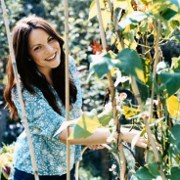 Photo: Getty Images
Photo: Getty Images
Since 1826, when French lawyer and epicurean Jean Anthelme Brillat-Savarin wrote the slogan, “Tell me what you eat and I will tell you what you are,” the idea of eating healthy foods to stay healthy has been, at least to some degree, in the consciousness of generations.
Over the years, the motto has gone in and out of vogue until the 1960s hippie era gave us a more modern version of Brillat-Savarin’s words. “You are what you eat” was embraced by the collective lexicon of a changing world and at last there was mounting scientific evidence to prove it. Today, words like “whole foods” and “organically grown” may sound expensive, but healthy foods like these don't have to be expensive if you grow them yourself.
Home gardening is seeing a renaissance as food prices soar and families are increasingly limited to fresh fruits and vegetables, as well as recent food safety concerns and political unrest in regions around the world.
Kitchen Gardeners International (KGI), a not-for-profit organization in Scarborough, Maine that promotes organic gardening globally, is one group helping to drive the movement. Backyard garden enthusiasts say the practice costs less than buying your food from the store, the food tastes better, in the short term the activity helps to reduce stress, and in the long term you get better health.
In addition, growing your own food gives you access to a larger variety of nutrients, makes for a lighter carbon footprint and gives you satisfaction and peace of mind in knowing where your food comes from.
First Lady Michelle Obama brought attention to the backyard gardening movement in 2009, when she dug up a patch of the White House south lawn to plant a vegetable garden, a move inspired by KGI. The garden wasn’t merely to provide organic food for the first family and formal dinners, but to educate children about healthful, locally grown fruits and vegetables at a time when obesity and diabetes has become a national health concern. The practice continues today. Total annual cost of the garden: $200.
Growing your own food is a nice idea, but is “you are what you eat” just a mere slogan, or a way of life? And is there really any truth to notion of health benefits from eating organically?
Michele R. Forman, a researcher at University of Texas M.D. Anderson Cancer Center said that by simply eating four or more servings of green salad a week from your own garden, and doing your gardening once or twice a week, both smokers and non-smokers will be able to substantially reduce their risks of developing lung cancer during their lifetimes. Why? Home gardeners get physical exercise by tending the crops, and having good nutrition by eating fresh organically grown fruits and vegetables.
Forman’s study looked at salad consumption and gardening, she said, because "salad is a marker for the consumption of many vegetables and gardening is an activity in which smokers and nonsmokers can participate."
Over the last three decades, the scientific and health policy communities have increasingly recognized the importance and role of healthy foods in cancer prevention. The first line of evidence that food and nutrition play a role in the origin of cancer comes from international variation in cancer rates combined with the diversity of eating patterns around the world.
For example, in Westernized countries where large amounts of processed foods are consumed, breast cancer, the most common cancer among women, is five times higher than in less developed countries and Japan. Researchers point to two primary factors: processed foods are packing on the pounds and the lack of exercise is keeping it on. Being overweight or obese is linked to many cancer types: esophageal, colorectal, breast, endometrium and kidney.
Making smart food choices, such as eating diets high in vegetables, fruits and grains, show a protective effect against many cancers. Conversely, eating diets high in red or preserved meat is associated with an increased risk of colorectal cancer and heart disease.
At least one-third of all cancers are preventable and prevention offers the most cost-effective strategy for cancer control, according to the World Health Organization. Healthy eating habits that prevent the development of diet-associated cancer also lower the risk of cardiovascular disease and type 2 diabetes.
On a global basis and at current rates, eating healthy and getting enough exercise would prevent between a staggering three to four million cases of cancer per year, according to the Australian National Cancer Prevention Policy 2009 report.
Part II of the backyard gardening series will look at the practicality of growing your own food regardless of where you live and other health benefits if you do so.
Lynette Summerill is an award-winning writer who lives in Scottsdale, Arizona. In addition to writing about cancer-related issues for EmpowHER, her work has been seen in newspapers and magazines around the world.






Add a Comment1 Comments
Great food for thought. Regarding the differences in breast cancer rates btwn Western developed countries and "developing" countries and/or Japan, consumption of fresh veggies is just one of many important factors. Growth hormones in U.S. animal products, agrochemicals (many of those used in U.S. are long-banned in EU), GMO's, plastic wrap and plastic food containers galore, endless varieties of toxic household products, all are far more common in U.S. households and foods than Western Europe, Japan or especially developing countries. So we not only eat less veggies in the U.S. but probably need them more to counter all the other carcinogens we consume.
Thanks for writing!
April 13, 2011 - 6:53amThis Comment